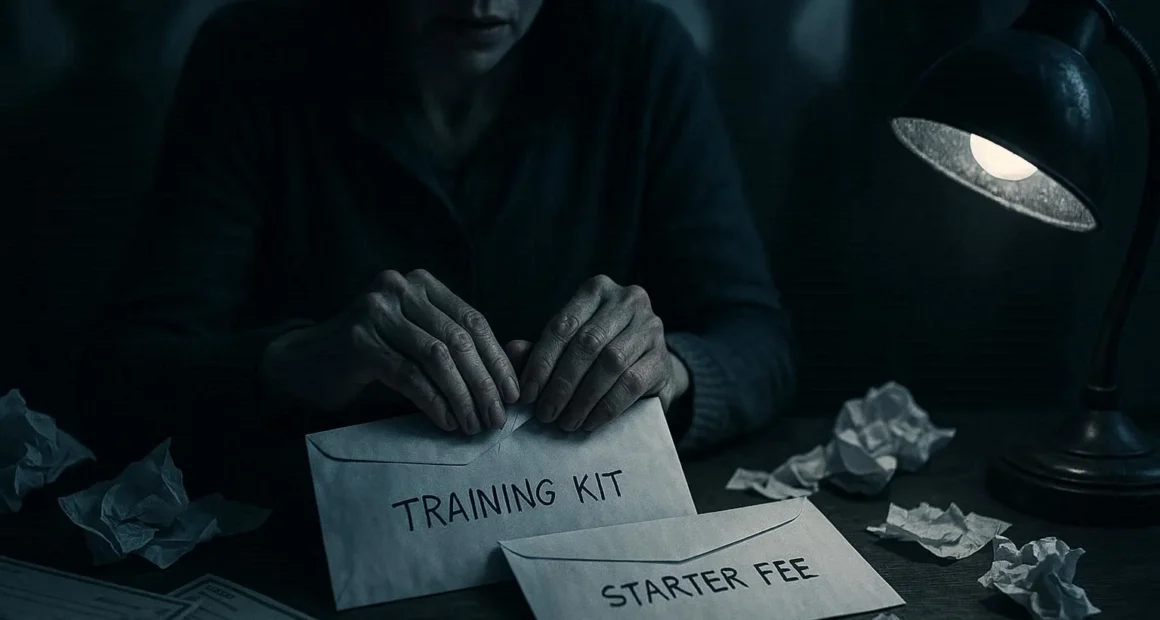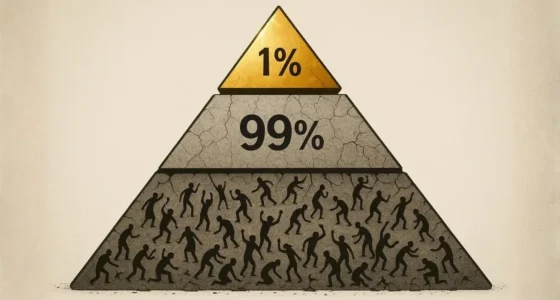The Quiet Horror of Work-from-Home Scams
It starts with hope.
A single mother scrolling late at night. A laid-off worker is checking job boards. A retired man trying to make ends meet. Then, like a whisper in the dark, the ad appears:
“Earn $1,200 a week from home. No experience needed.”
The message glows like salvation.
But it isn’t.
Behind the promise of easy income lies one of the oldest financial horror stories on the internet — work-from-home scams that prey on the desperate, the hopeful, and the tired.
These scams steal over $250 million every year, disguised as envelope stuffing, data entry, or remote administrative work.
Here’s where the nightmare begins.
The Lie That Feels Like a Lifeline
The scam unfolds with eerie precision.
First, a “recruiter” emails back. Their tone is warm, reassuring — the kind of voice you want to trust. They say the job is simple: stuff promotional letters into envelopes, or input data from home.
Then comes the first red flag, wrapped in logic.
They ask for a “processing fee” — usually $49, $89, sometimes $150 — to send “training materials.”
Victims don’t see it as a fee. They see it as an investment.
And that’s exactly what the scammers count on.

“Maria” — The Envelope That Never Came
Maria Thompson, 41, from Ohio, was one of them.
She lost her job during the pandemic. Bills stacked up. Her husband worked double shifts. One night, she found an ad: “Work From Home — Start Immediately. Earn Up to $1,200/Week.”
She paid $89 for the starter kit. Then another $120 for “priority placement.”
Weeks passed. No envelopes arrived. No paycheck came.
When she emailed the recruiter, her message bounced back. The phone number was disconnected.
“I thought I was helping my family,” she said, voice trembling. “Instead, I paid someone to disappear.”
Her story isn’t rare — it’s routine. The FTC logged over 16,000 work-from-home scam complaints in 2023 alone.
Data Entry Dreams Turned to Dust
Then there’s David, 56, from Texas.
He thought he landed a simple data entry job. The company claimed to be a subcontractor for a major firm — complete with fake LinkedIn pages and fake contracts.
They mailed him a $3,500 check for “software setup.”
They told him to deposit it, then wire $2,900 to a “vendor.”
By the time his bank realized the check was fake, the money was gone.
David lost $2,900 — and his bank account was frozen for months.
He said, “They didn’t just steal my money. They made me their accomplice.”
According to the Better Business Bureau, this scam type — known as “fake check employment fraud” — has increased over 183% since 2021.

Why the Scams Keep Coming
The predators thrive because the victims keep hoping.
Every economic downturn, every mass layoff, every time the world gets harder — the scammers reappear.
They change their names, redesign their websites, use new domains that look eerily professional.
They mimic real companies.
They buy ads on social media.
They flood Facebook, Telegram, and job boards with fake listings.
Even AI-generated job postings are now being used to trick applicants.
And for every scam shut down, three more take its place.
The Anatomy of the Trap
Most work-from-home scams follow the same script:
• Step 1: Target vulnerable groups — single parents, seniors, students.
• Step 2: Promise easy money and flexible hours.
• Step 3: Demand a “setup” or “training” fee.
• Step 4: Vanish once payment clears.
• Step 5: Resurface under a new name.
The illusion is powerful.
Because it preys on hope — not greed.
The Digital Graveyard of Victims
For many victims, the shame is worse than the loss.
Some never report it. Some tell no one.
They sit in silence, afraid of judgment — afraid people will call them naïve.
But this isn’t naivety. It’s trust, weaponized.
According to the Federal Trade Commission, less than 40% of job scam victims ever recover a cent.
That means most never see justice.

How to Protect Yourself
If a remote job asks you for money first, walk away.
If it sounds too easy, it’s a trap.
Before applying, search the company name + “scam”.
Check official domains.
Never send checks or wire transfers to strangers.
And always remember: real employers pay you — not the other way around.
The Final Warning
Work-from-home scams are the modern ghost stories of our economy — whispered in chat forums, buried in inboxes, haunting the desperate.
They look like hope.
They sound like safety.
But they end in silence.
So next time you see that glowing ad promising freedom, remember Maria. Remember David.
And remember this — the scariest monsters don’t hide in the dark. They hide behind your screen.
Resources
[1] Federal Trade Commission. “Consumer Sentinel Network Data Book 2023.”
[4] Federal Trade Commission. “Job Scams and Consumer Advice
Related reading(suggested)
Essential Oils MLM Scams: DoTerra & Young Living Truth
Amway Income Disclosure: Real Math Behind “Diamond” Success
The Shocking $4 Billion OneCoin Scam: Where is the Vanishing Cryptoqueen









